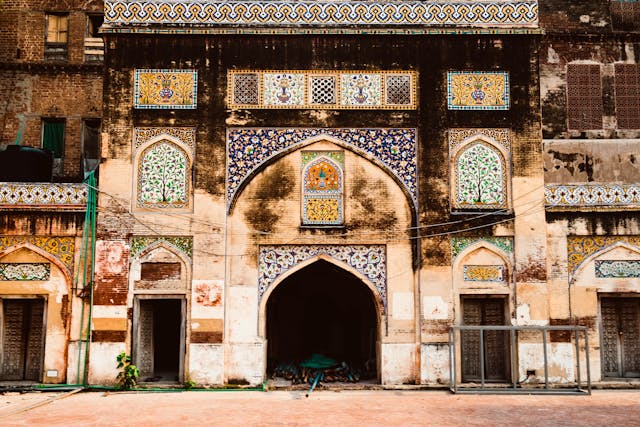Essential Urdu Greetings to Help You Get By in India
If you’re planning a trip to Pakistan, parts of India, or anywhere with a large Urdu-speaking community, learning a few basic Urdu greetings is one of the simplest ways to show cultural respect and connect with locals. While many people you meet may understand some English, making the effort to greet them in their own language goes a long way. It shows curiosity, politeness, and a genuine interest in the culture.
Table of Contents
→Sign Up Now: Free Trial Urdu Lesson With a Native Teacher!←
You don’t need to become fluent—no one’s expecting that. But knowing how to say “hello,” “thank you,” or “how are you?” in Urdu can open doors, start conversations, and earn a few smiles along the way. In this guide, we’ll walk you through the most essential Urdu greetings, along with other polite phrases and useful travel expressions that will help you feel more confident wherever you go.
How to Say Hello in Urdu
The most common way to say hello in Urdu is:
- السلام علیکم (Assalamu Alaikum) – Peace be upon you
This greeting is widely used to say hello in Urdu in Pakistan and among speakers of the language around the world. It’s both formal and respectful, making it appropriate in nearly every context. The typical response is: - وعلیکم السلام (Wa Alaikum Assalam) – And peace be upon you, too
This exchange is not just a greeting—it carries cultural and religious meaning and is considered good etiquette when meeting someone.
In more casual or secular settings, you might hear:
- ہیلو (Hello) – Pronounced just like in English
- سلام (Salam) – A shorter version of Assalamu Alaikum
Using any of these greetings—especially Assalamu Alaikum—will help you start interactions on the right note and show that you’re making a genuine effort to connect.
Other Common Urdu Greetings
Once you’ve mastered Assalamu Alaikum, there are a few other common greetings that will help you sound even more natural in everyday situations.
- آپ کیسے ہیں؟ (Aap kaise hain?) – How are you?
This is the formal version, used when speaking to someone older or someone you don’t know well. - تم کیسے ہو؟ (Tum kaise ho?) – How are you? (informal)
Used among friends, family, or people your own age.
Note: Use kaise when speaking to a man and kaisi when speaking to a woman:
- آپ کیسے ہیں؟ (Aap kaise hain?) – How are you? (formal, male)
- آپ کیسی ہیں؟ (Aap kaisi hain?) – How are you? (formal, female)
Other helpful greetings include:
- صبح بخیر (Subah bakhair) – Good morning
- شام بخیر (Shaam bakhair) – Good evening
- شب بخیر (Shab bakhair) – Good night
While these aren’t used as frequently as “good morning” or “good night” in English, they are still recognized and appreciated in polite conversation.

Saying Please, Excuse Me and Thank You in Urdu
Politeness matters in any language, and Urdu is no exception. These Urdu phrases are key to showing respect and navigating daily interactions smoothly:
- مہربانی (Meherbani) – Please
- براہ کرم (Barah-e-karam) – Kindly / Please (more formal)
Use these when requesting something or asking for help in a polite tone. - معاف کیجیے (Maaf kijiye) – Excuse me / I’m sorry
Use this when trying to get someone’s attention or when apologizing. - سنئے (Suniye) – Excuse me / Listen
A polite way to address someone in public when you need their attention. - شکریہ (Shukriya) – Thank you
- بہت شکریہ (Bohat shukriya) – Thank you very much
These Urdu expressions, while short and simple, go a long way in making your interactions smoother and more respectful.
Beyond Urdu Greetings: Useful Phrases for Travellers
Once you’re comfortable with greetings, it’s helpful to know a few basic Urdu phrases that you’re likely to use during your travels. These can help you with transportation, food, shopping, and other day-to-day situations.
- مجھے نہیں معلوم (Mujhe nahi maloom) – I don’t know
- کیا آپ انگریزی بولتے ہیں؟ (Kya aap angrezi boltay hain?) – Do you speak English?
- یہ کتنے کا ہے؟ (Yeh kitne ka hai?) – How much is this?
- مجھے یہ پسند ہے (Mujhe yeh pasand hai) – I like this
- باتھ روم کہاں ہے؟ (Bathroom kahan hai?) – Where is the bathroom?
- مدد کی ضرورت ہے (Madad ki zarurat hai) – I need help
Learning just a handful of phrases in Urdu like the ones above will help you navigate daily interactions and make your trip feel much smoother—and more rewarding.
Summing up, you don’t need to speak perfect Urdu to make a connection. Just knowing how to greet someone properly, thank them politely, or ask a simple question in their language shows that you care about their culture—and that’s something people always appreciate. So keep these phrases handy as you travel, and you’ll find yourself building bridges and earning smiles everywhere you go!
→Sign Up Now: Free Trial Urdu Lesson With a Native Teacher!←
Ready to go beyond how to say hello in Urdu? At Listen & Learn, we offer in-person Urdu lessons with native-speaking teachers who bring not just the language—but the culture—into every class. Learning face to face allows you to ask questions freely, build real conversational skills, and understand how Urdu is spoken in everyday life. Whether you’re learning for travel, work, or personal interest, our teachers tailor the lessons to your pace, goals, and interests. Book your first Urdu lesson today and start experiencing the language the way it’s truly meant to be used.


